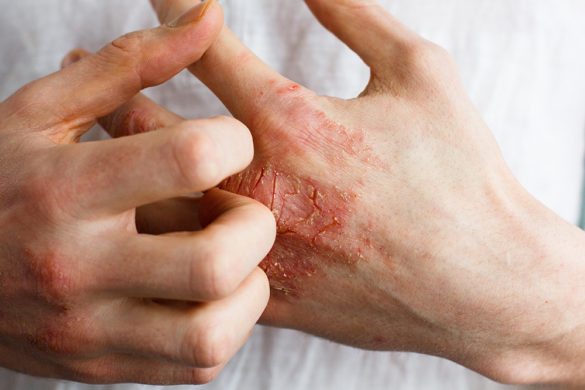While there are several types of eczema, the most common is atopic eczema (atopic dermatitis). This is a skin condition that causes the itchy, dry and cracked skin associated with eczema.
Anyone can develop atopic eczema in adulthood, although it is more often seen in babies and children, starting at a young age. Children can grow out of eczema totally, or the condition will continue and even sometimes reappear through teens and adult years.
Being a long-term condition, it is not unusual to experience times when atopic eczema is less noticeable, although there could be periods when symptoms get worse, and you experience flare ups.
Other Types of Eczema
- Discoid eczema – This eczema occurs in circular or oval patches on the skin.
- Contact, Irritant or Allergic dermatitis – Arises when the body comes into contact with a particular substance.
- Varicose eczema – Most often affects the lower legs and is caused by problems with the flow of blood through the leg veins.
- Dyshidrotic eczema (pompholyx) – Eczema that causes tiny blisters to erupt across the palms of the hands.
- Asteototic eczema – Affects ageing or dry skin and described as “cracked porcelain” as the skin appears dry and cracked.
What does eczema look like?
 Atopic eczema causes the skin to become itchy, dry, cracked and sore. The extent of eczema is different for everyone, from small patches of dry skin to extensive inflamed red skin all over the body.
Atopic eczema causes the skin to become itchy, dry, cracked and sore. The extent of eczema is different for everyone, from small patches of dry skin to extensive inflamed red skin all over the body.
In fact, atopic eczema can affect any part of the body, but usually it appears on hands, inside elbows, backs of the knees.
Should I see a dermatologist for eczema?
A dermatologist will be able to diagnose eczema by looking at your skin and asking questions about your skin condition and family history. They can then help navigate when it’s worth investigating further and what treatment is suitable to manage your symptoms.
While the exact cause of eczema is unknown, and the answer to the question whether eczema is an allergy or not is usually the fact that it’s not about one single thing.
Atopic eczema may occur in people who get allergies, and the symptoms of eczema can have certain triggers, such as soaps, detergents, stress and the weather. Most cases of eczema (about 80%) is ‘internal’, and not related to any outside cause.
It is not uncommon for eczema or atopic dermatitis to be associated with asthma and hay fever and is often referred to as the atopic triad by healthcare professionals and dermatologists, with many people have all three conditions.
If you have any type of eczema concerns or would like some further advice and information on eczema treatments, dermatitis or other skin problems our expert dermatologists are here to help. Contact Diamond Skin Care on 01603 298396 or book an appointment.


